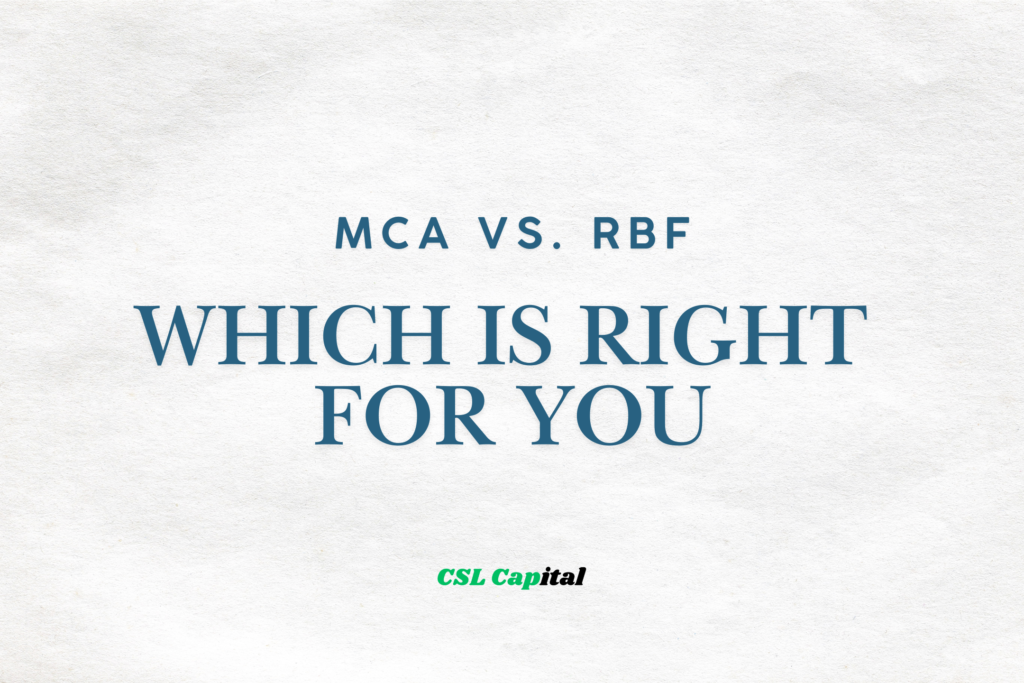When it comes to securing financing for your business, two common options are Merchant Cash Advances (MCAs) and Revenue-Based Financing. Choosing between the two can be a challenging decision, as both have their own set of advantages and disadvantages. In this article, we will delve deep into the world of MCA vs. Revenue-Based Financing to help you determine which option is the right fit for your unique business needs.
MCA vs. Revenue-Based Financing: Which Is Right for You?
Merchant Cash Advances (MCAs) and Revenue-Based Financing are both popular choices for businesses looking to access quick funds. However, they operate in different ways and cater to different needs.
What is an MCA?
An MCA is a lump sum payment given to a business in exchange for a percentage of its daily credit card sales plus a fee. It’s a quick way to access cash but can be costly in terms of fees.
What is Revenue-Based Financing?
Revenue-Based Financing, on the other hand, provides capital in exchange for a percentage of the business’s future revenue. This can be a more flexible option compared to MCAs.
Pros and Cons of MCA vs. Revenue-Based Financing
Pros of MCA:
Quick access to cash
Easy application process
No collateral required
Cons of MCA:
- High fees
- Daily payments can impact cash flow
- Can be expensive in the long run
Pros of Revenue-Based Financing:
- Flexible repayment structure
- Payments tied to revenue
- Can help smooth out cash flow
Cons of Revenue-Based Financing:
- Higher cost compared to traditional loans
- Revenue-sharing can impact profitability
MCA vs. Revenue-Based Financing: How to Choose
Choosing between an MCA and Revenue-Based Financing depends on various factors such as your business’s cash flow, revenue projections, and financing needs. Here are some questions to consider:
- How quickly do you need funds?
- What is your average monthly revenue?
- Are you comfortable with daily repayment structures?
- Do you prefer fixed or variable repayment amounts?
- How important is flexibility in repayment terms?
- Are you willing to share a percentage of your revenue in exchange for financing?
FAQs
FAQ 1: Can I apply for both MCA and Revenue-Based Financing at the same time?
Yes, you can explore both options simultaneously to compare offers and choose the best fit for your business.
FAQ 2: Which option has lower fees, MCA or Revenue-Based Financing?
Typically, Revenue-Based Financing has lower fees compared to MCAs, but it’s essential to compare offers from different providers.
FAQ 3: Will either option impact my credit score?
Neither MCA nor Revenue-Based Financing requires a minimum credit score for approval, making them accessible to businesses with varying credit profiles.
FAQ 4: Can I pay off the financing early?
Some providers may allow early repayment without penalties, while others may have restrictions. It’s crucial to clarify this with the lender beforehand.
FAQ 5: How does each option impact my business’s profitability?
Both MCAs and Revenue-Based Financing can impact profitability due to the associated fees and revenue-sharing agreements. It’s essential to calculate the cost of financing to assess its impact on your bottom line.
FAQ 6: Are there any tax implications for choosing MCA or Revenue-Based Financing?
Consult with a tax professional to understand the tax implications of each financing option on your business.
Conclusion
In conclusion, deciding between MCA vs. Revenue-Based Financing requires careful consideration of your business’s financial situation and needs. While MCAs offer quick access to cash, Revenue-Based Financing provides more flexibility in repayment terms. By weighing the pros and cons of each option and considering your specific requirements, you can make an informed decision that aligns with your business goals.
Remember, the key is to choose the option that best suits your business’s financial health and growth objectives. Whether you opt for an MCA or Revenue-Based Financing, understanding the terms, costs, and implications is crucial to making a sound financial decision for your business’s future success.




